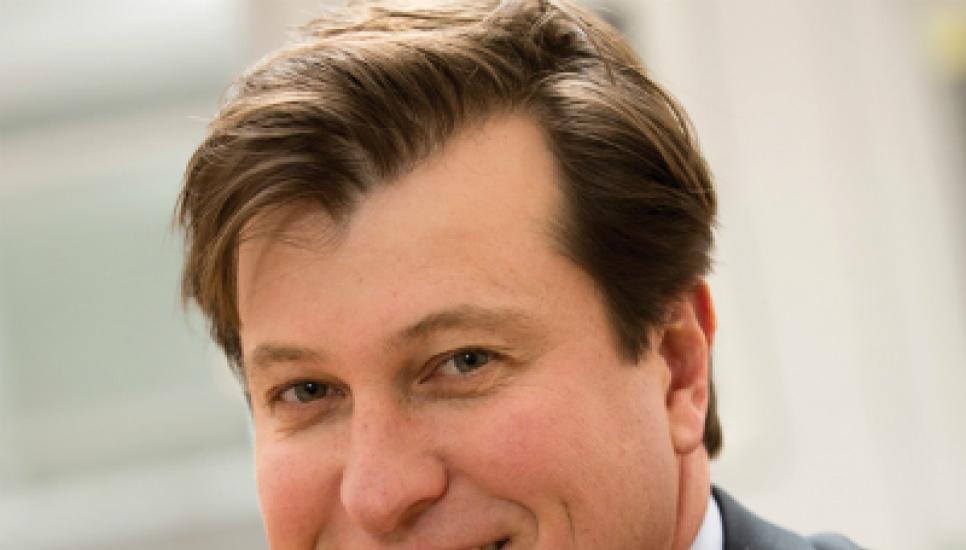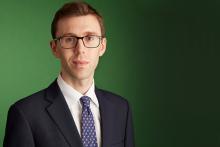One Thousand & One Voices - "patient capitalism"

For more than 20 years, McKay Belk, in his role as president and chief merchandising officer at his family’s third-generation family business Belk, has spent hundreds of hours every year crisscrossing the globe with his team.
He travelled widely to source products from across southeast Asia, China, India and Africa to stock its 300 plus stores - Belk is the largest privately-owned department store chain in the US generating $4 billion (€3 billion) in revenue in 2013.
“You see a great disparity in terms of people’s living conditions,” says McKay of his visits to emerging markets to visit suppliers. It was on one of his visits to Africa around the year 2000 that he was introduced to a fledgling apparel company in Mek’ele, northern Ethiopia, which was run by a dynamic, US-educated local. “Over a number of months we gave this particular factory some orders for what was very basic merchandise. And we brought in organisations that could share operational excellence for global competitiveness.”
The contract had a positive effect on the young company and McKay was able to see the impact. “It was just marvellous to visit that factory and to see the people employed and jobs created because of the orders, and the smiles on their faces, and the gratitude.” Then two years after Belk began sourcing products from the Ethiopian business, tragedy struck. The entrepreneur heading the business died from a sudden heart attack, creating problems with Belk’s orders. Due to this void in strong leadership following the tragedy, operational issues arose and the business relationship ended. Belk stopped sourcing the products from the manufacturer. Regrettably, this opportunity was lost. McKay says there were a number of other underlying problems that also made it tough for the Ethiopian business to prosper. Logistics was one reason: the country is landlocked and so does not have a port. This created supply chain challenges. Although the company had problems, global experience could have helped solve these local issues.
Fast forward to today and McKay Belk is now part of One Thousand & One Voices — an organisation that is putting the structures in place to ensure businesses like the one Belk had seen fail in Ethiopia shouldn’t happen again. Dr John Coors, fourth-generation chief executive of ceramics company CoorsTek and a member of the Coors US brewing dynasty, is behind the launch of the investment group, which is targeting Africa and is backed up by 15 other wealthy families. Founder of Pennsylvania-based investment manager Brinker Capital Charles Widger is another current member. There is no membership fee if families join and commit capital as an investor.
Launched May last year in Cape Town, One Thousand & One Voices is looking to initially invest $300 million in sub-Saharan Africa. This is a small slice of Africa’s total private equity pie, estimated at about $20 billion in funds under management, according to the African Private Equity and Venture Capital Association. Although it launched in Africa, One Thousand & One Voices plans additional funds for other emerging market regions including Latin America and eastern Europe.
“One Thousand & One Voices was established with the belief that the pathway to economic freedom – real prosperity for millions living in poverty – is through values-based private investment grounded in the time-tested principles of free enterprise,” Coors declared at the launch.
The group’s modus operandi is to invest with an eye on “patient capital” that will emphasise long-term returns rather than speculative short-term rewards. One Thousand & One Voices said this approach was designed to address the shortcomings in traditional private equity and impact investment funds prevalent today. It calls the model “private family capital” and is based on the idea that mobilising a group of the world’s leading families, together with their capital, would “move the needle”, according to its chief executive and president Hendrik Jordaan. Only families are allowed to be investors with more than 15 already committed as it seeks to grow towards around 30.
Its membership is primarily US based at present, with one African family involved, and the intention is to build a global family base. “Typical funds target families that can write them big cheques quickly. That’s not the way we’re approaching it,” says Jordaan, who brims with enthusiasm for his mission.
“We’re sitting down and saying ‘who are the families who really believe in what we believe in? Who are the families representing key geographies that are accretive to the portfolio? Who are the families that are industry leaders in key industries that could drive value?’”
One Thousand & One Voices won’t disclose how close to the $300 million target it is only saying it is “substantially” close to the goal.
The group says its “patient capital” approach is one part of its so-called “three dimensional” investment concept. Rather than just injecting their cash, the families involved in One Thousand & One Voices are responsible for leveraging their business experience or intellectual capital, and their “relational capital” – their connections and contacts – on behalf of businesses they invest in.
“We are putting in the intellectual and relational experience in order to create more sustainable jobs,” Belk says, emphasising that the goal is to create prosperity on an on-going basis.
The founding families see adding their experience running significant multi-generational businesses as the critical differentiator between One Thousand & One Voices and similar private equity funds.
“I’ll give you an example,” says Jordaan. “One family investing with us is involved in one of the leading logistics businesses in the world. A member of the family, or someone in such person’s network, may spend time with a portfolio company two or three times a year in Africa. It may be a situation where the former chief executive, or the head of procurement, or the VP of sales or marketing flies over to Africa to spend time in the portfolio company’s headquarters.”
Coors is already actively engaged in discussions with a company’s leadership to understand more and share ideas. Belk is set to add his expertise with consumer and logistics/distribution companies shortly.
One Thousand & One Voices is looking for specific characteristics in potential investments: cash flow positive companies, with $5-15 million in Ebitda, although it will consider companies down to $2 million Ebitda. It’s also clear what they’re not looking for. “We’re not doing microfinance, we’re not doing venture capital, we’re not doing greenfield [investments],” says Jordaan.
“These are companies that have demonstrated cash flows from a profitable business model. They are looking for the right partners to take the businesses from a successful but small place to building something that can be amazing,” Jordaan emphasises.
One Thousand & One Voices is seeking to invest in 10 to 20 companies in the next five to 10 years and is currently evaluating 100 companies. It has yet to invest in any businesses, but expects to make its first investment in 2014. Its investment thesis is centred on consumer facing businesses, or companies that are linked to the growing consumer and middle class. Consumer, logistics/distribution and agribusiness are three particular areas of interest. Its sector focus is 100% based on the expertise of its families, so if one of its investor families is not involved in that sector it won’t invest as the value it can add comes from the specialist know-how its families can call on.
Due to this experience-based approach, One Thousand & One Voices is not on a first-come-first-served basis. Jordaan says it has turned down families who were not the right fit, although the primary means of expanding the membership is through family-to-family introductions.
“This is a group where multiple generations of the family can be involved, and where families commit more than money: families commit intellectual capital. So we recruit them in to be part of our movement, not expecting them to just write a cheque and disappear and expect a return, that’s not it. It’s a movement where families believe in what we’re doing,” says Jordaan.
The group has four offices in the US, where it is headquartered, South Africa, the UK and Mauritius with additional offices planned for Nigeria and Kenya. Jordaan has more than 16 years of experience in the private equity and mergers and acquisitions industry as a former partner and global chair of the private equity investments and buyout practice at US law firm Morrison & Foerster. He got involved with One Thousand & One Voices having discussed the idea with John Coors for a number of years. Its team of private equity and investment specialists includes Navaid Burney, a former director and head of private equity for Africa at Standard Bank of South Africa and Dag Skattum, previously a partner at TPG Capital and a former co-head of global mergers and acquisitions at JP Morgan.
One Thousand & One Voices’s decision to choose Africa as its starting point is driven by broadly positive socio-economic trends: the spread of democracy, relatively low levels of public debt compared with mature markets, increasing education levels and a growing working population.
Data backs this up. Economic growth in sub-Saharan Africa hit 4.7% in 2013 and is forecast to rise to 5.2% in 2014 driven by rising investment in natural resources and infrastructure, the World Bank reported. The bank predicts a further climb to 5.5% in 2015.
Research by Goldman Sachs suggests that by 2030, the combined GDP of the largest 11 African economies will overtake Italy and Canada and could potentially be as large as France.
Nish Kotecha agrees that the Africa growth story is a powerful one, but urges investors that they have to be on the ground to find firms in the $2-10 million Ebitda range.
Kotecha is managing director of Fusion Group which is an Africa-focused fund manager specialising in private equity, real estate and money markets that invests in local SME businesses in the emerging economies of east and central Africa. Kotecha’s family hails from east Africa.
“Finding the right businesses and working with them is very challenging, it is very hard work. You’re working with microenterprises in a developed world context. You are mentoring them one step at a time,” warns Kotecha.
Fusion has completed more than 270 investments focused on the SME market in east Africa. It won’t disclose its investment returns, although its average non-performing assets from its portfolio of early stage SMEs sits at 5%.
“We agree completely with the demographic story. The aspiring consumers at the base of the pyramid are not going to stop. All they want to do in their lives is progress up the income curve – that is an aspiration you can invest in.
“[Africa] is the last untapped continent for playing the base of the pyramid investment opportunity. What is attractive about Africa is the [number of] domestic economies driven by natural resources. The timing now is excellent,” adds Kotecha.
However he warns that the biggest risk is valuation, “it’s incredibly easy to overpay. The only way not to overpay is broaden your universe of opportunities, work with people with real presence on the ground. There’s no shortcut – you can fly in and make an investment and feel good about it, but know you’ve paid up for it. It’s tough to sort through the numbers.”
For all its emphasis on “three-dimensional investing”, the concept sounds to many as a tweak on impact investing, although One Thousand & One Voices’s chief executive is adamant what it is doing is not impact investing that accepts lower financial performance. “This is not philanthropy, this not impact investment in the sense of reduced returns,” says Jordaan, the fund aims to deliver top returns, although he can’t reveal precise target figures. However The Impact Investor Survey, a report released by JP Morgan and the Global Impact Investing Network (GIIN) in May, challenges Jordaan’s assertions about impact investing delivering reduced returns. The survey of 125 of the world’s largest impact investors found 54% targeted competitive, market rate returns – which rose to 60% among North American respondents.
One Thousand & One Voices aims to hold assets for much longer, on average, than a typical private equity fund whose time horizons are three to four years – although it does not rule out short-term deployments.
Taking the long view is what it’s all about for Belk.
“We’re willing to do it in a way that families have built wealth over many years, which is patient capital, and make decisions and use of capital for the long-term. Building family wealth often takes 10, 15, 20 years,” Belk adds.
“We’re looking for returns that are beyond financial. We want to spur economic creation in the lives of the entities and the people that are employed there over time,” says Belk, although they do want it to make economic sense. “We’re not going to lower our financial expectations over multiple years. We think we can accomplish both for multiple returns.”
Getting the next generation of family members involved is another differentiator from traditional private equity. One Thousand & One Voices provides office space in some of its locations that are reserved exclusively to allow family and next generation members to work in its premises. It was a big attraction to Belk.
“My older kids, who are in their late 20s, got so excited about this,” enthuses Belk. “There’s a whole generational effect about using this family capital in such a positive way. I’ve taken my oldest son, who is 25, to Africa previously and this echoes really well with the Millennial generation.”
“That [Millennial] generation is looking for authentic initiatives where capital is used not just for financial return. Many of them are looking for authentic initiatives and experiences where people have the opportunity to grow and better themselves and their family,” Belk concludes.
Jordaan concludes our interview in his characteristically impassioned way: “We’re not about sacrificing financial returns or building companies that don’t create many jobs and don’t have much growth. We think the way to do it, which is further differentiation from certain types of impact and other investment funds, is based on a first-of-a-kind approach that brings together the world’s leading families the way we’re assembling them by industry and by geography, to agree collectively that they can do more to build transformative companies the right way.”
Passionate families with patient capital: it’s a powerful formula.






